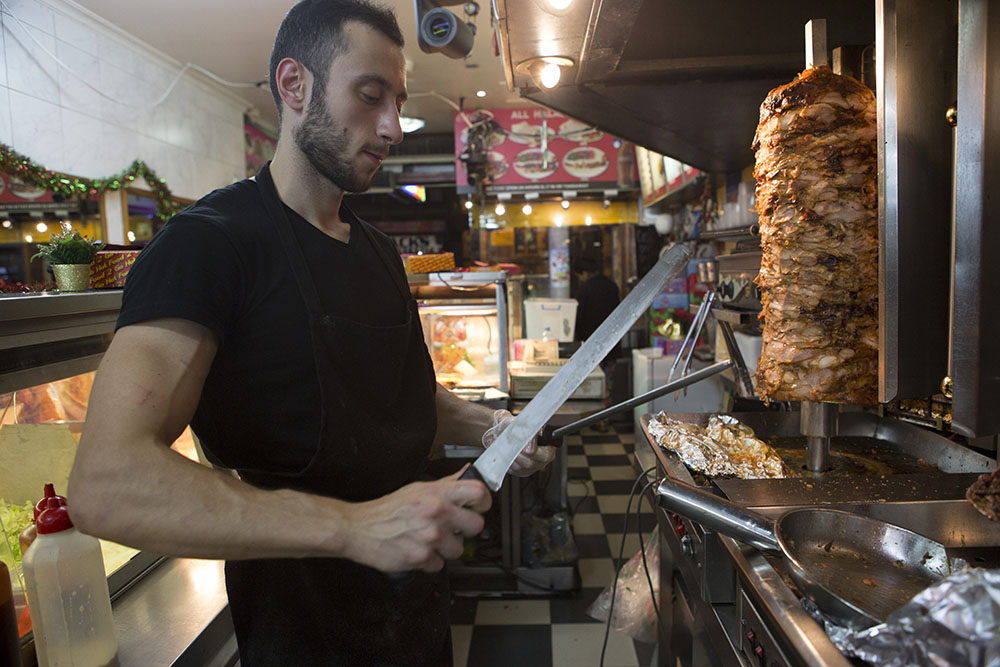Kebab Kings: A celebration of Australia
Behind the counters of ubiquitous Australian kebab shops, a treasure trove of drama and heart was just waiting to be discovered for SBS doco Kebab Kings.
 Kebab Kings
Kebab Kings
Walk into any popular kebab shop on a Saturday night and you can find a stunning cross-section of Australian society.
The old, the young, the wealthy, the working class, and yes, the ones who have a few beers under their belt, can all be seen lining up for a late-night feast.
You would be forgiven for not immediately thinking this would translate to a three-part documentary series, but as executive producer Michael Cordell found out, it’s television gold.
Because while these people wolf down their kebabs, or share a bucket of chips, or fall off their seats in a drunken mess, nothing is off the cards.
“It’s really surprising the range of people and hilarious discussions about the most bizarre things that we eavesdrop on. Things that you could never script,” he says.
“People talking about drugs and alcohol, sex, dating, Tinder, politics, relationships: a million different discussions that give a snapshot of contemporary Australia.”
At the heart of it, are the two kebab shops – Oz Turk on Sydney’s George Street and Smith Kebabs in Melbourne’s Collingwood.
Cordell says they searched far and wide for two shops that were in a bustling location, but also had a strong story to tell.
For Oz Turk, the family who lovingly built up the shop and customers over 14 years of hard work and sacrifice make the heart-breaking decision to sell-up to concentrate on their health. But there’s some tension when it comes to the ambitious new owners, who want to change the way things are run.
Meanwhile in Melbourne, the young couple running Smith Kebabs have built the Australian dream for themselves after emigrating from India almost a decade ago. But the pressure is on to balance time with their young family and look after the business, especially when they take a huge financial risk to expand it.
“Interspersed between the narratives of the shop owners are all the encounters with the customers, which are really compelling and completely unpredictable,” Cordell says.
“On the one extreme you’ve got people that are drunk and very poorly behaved and occasionally verging on racist, but other times you’ve got people that are fantastic and good-humoured.”
The three-part series was filmed over almost a month in the lead up to Christmas 2014 – the busiest time of year for kebab shops. Using fixed rig cameras, they captured 3,000 hours of footage, which had to be whittled down to just three, one-hour episodes.
Signs were put up throughout the stores during filming, but with no traditional camera crew around, people let their guard down in a way that wouldn’t have been possible otherwise.
The result is a raw, unflinching look at multicultural Australia – the good, the bad, and the plain ugly.
“The material we got is really, really unfiltered, so you never really get the sense that people are performing for the cameras or they’re holding back. It’s really refreshing, spontaneous, and feels very real,” Cordell says.
But amid the antics and drama, an interesting message about Australian society emerges.
“We are living in a time of extraordinary division where some of the fabric of our society is fraying at the edges a little bit,” Cordell says.
“You’ve got extremist groups calling for reducing the number of migrants, refugee intake and being ill disposed towards Muslims in particular.”
It’s in kebab shops that multicultural Australia collides with white Anglo-Saxon Australia, but the story Cordell discovered wasn’t about a fiery culture clash.
“If there’s one observation that comes through, it’s that if these shops are a reflection of modern Australia then people are actually getting on really well,” he says.
“Sure, there are occasional flare ups, there are instances of racism, but there’s a really lovely warmth and generosity that is more often displayed than division and angst.”
At Oz Turk, owner Fatima is called Mama by one of her regulars, because of how much she cares for her customers. They include Sydney’s homeless, with Oz Turk offering them food and a seat out of the rain.
Meanwhile in Melbourne, owners Mustafa and Zareena are devout Muslims and don’t drink, smoke or party, yet they run a shop sandwiched between two gay bars and pubs.
“So in a way their business is all about serving people whose values and beliefs might be quite different from theirs,” Cordell says.
“But they are not at all judgmental and very tolerant, so you basically get a really warm celebration of Australians getting on rather than being at odds with one another.”
Catch Australia’s melting pot of cultures in Kebab Kings, with the first of three episodes airing on SBS on Wednesday 25 November, and available after that via http://www.sbs.com.au/ondemand/